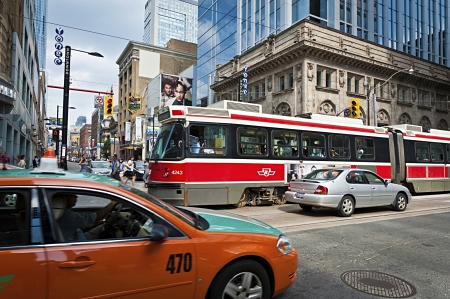A poll by the Canadian-based Angus Reid Institute (ARI) finds a country divided about ride-hailing services such as Uber.
 On one hand, given the choice to subject Uber to the same regulations as the taxi industry or allow it to operate without such rules, nearly two-thirds of Canadians say the company should be regulated.
On one hand, given the choice to subject Uber to the same regulations as the taxi industry or allow it to operate without such rules, nearly two-thirds of Canadians say the company should be regulated.
On the other hand, nearly three-quarters of Canadians are open to Uber operating in their communities, and just one-in-six would ban the company in their city.
And even though most Canadians are aware of Uber only one-in-ten have actually used the service.
The majority (63%) say Uber should be regulated in the same way as the taxi industry. Among those who have an opinion, the majority (61%) has a positive view of Uber.
There is a generational divide in opinion about Uber with younger respondents holding more favorable views than their elders.
Taxi drivers in Toronto, Montreal and other Canadian cities argue that Uber is unfair competition because it’s not subject to the same regulations that govern the taxi industry.
For its part, Uber’s terms of service describe the company as a technology platform that connects people who need rides with drivers willing to provide them. It explicitly states that “Uber does not provide transportation or logistics services or function as a transportation carrier,” meaning it can’t be subject to regulations that apply to such carriers.
Asked to choose between governments regulating Uber in exactly the same way as they do taxis or maintaining the status quo where Uber is not regulated, most Canadians choose the former.
A majority in every region chooses this option, but the feeling that Uber should be regulated in the same manner as taxis is strongest in Quebec (72%).
People who have used Uber are most likely to take the opposite position. Some 60 per cent of past Uber users say the company should be allowed to continue operating without the same regulations as taxis. Of course, this means that even a sizeable portion of Uber’s Canadian user base (40%) would prefer to see the company subjected to the same regulations as taxis, rather than not.
The data suggests that when it comes to allowing Uber, many Canadians would like to find a regulatory middle ground, as the Edmonton City Council attempted to do in its recently approved bylaw legalizing Uber in the city.
Asked whether they think Uber should be allowed to operate in their city, one-in-six Canadians (17%) say “definitely not.” Twice as many (33%) say “yes, definitely,” but the largest group is somewhere in between.
Fully two-in-five Canadians (40%) say Uber should be allowed to operate in their cities “under the right circumstances.”
The rate of agreement with a variety of statements about Uber helps shed some light on what Canadians may view as “the right circumstances” for allowing the company in their communities.
For example:
• 67 per cent of Canadians agree with the statement “Cab companies should step up their game to compete with Uber”
• 46 per cent agree that “Cities that don’t allow Uber are stifling competition” (28% disagree; 26% are unsure)
This indicates that there is an appetite for better taxi service and additional options in the marketplace.
Other findings highlight concern about Uber’s potential impact, however:
• Notably, most Canadians (57%) agree with the statement “I don’t feel comfortable with Uber raising prices during peak hours” – a practice traditional taxi companies are prohibited from engaging in.
• Two-in-five Canadians (39%) worry that “Uber will make working conditions worse for their own drivers and for taxi drivers” (26% disagree with this statement; and 35% are unsure).
On nearly every question in this survey, responses vary significantly by the age of respondents.
Younger Canadians tend to be more favorable toward Uber. They’re more likely to say Uber should “definitely” operate in their cities.
Older Canadians, by contrast, are more likely to favor regulating Uber in the same way as traditional taxi cabs are regulated.
This generational divide also extends to overall perceptions of Uber, with younger Canadians more likely to have a positive opinion and older Canadians more likely to have a negative one.
Most Canadians are aware of the ride-hail industry, but don’t consider themselves particularly knowledgeable about it.
The high rate of awareness of Uber may reflect the company’s divisiveness. Asked whether they have a positive or negative opinion about the company, fewer than one-in-four Canadians (24%) say they don’t know enough to make up their minds about Uber.
Opinion on Uber is most negative in Quebec, where three-fifths (61%) of those with an opinion (48% overall) say they view the company negatively.
In contrast, residents of Alberta have especially positive views (63% positive overall; 73% excluding the “don’t know” responses).
The only group with significantly more positive opinions of Uber than Albertans is people who have used Uber in the past. As might be expected, 91 per cent of this group expresses a positive opinion about the company.
